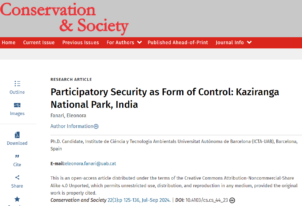
Fanari, Eleonora – Ph.D. Candidate, Institute de Ciència y Tecnologia Ambientals Universitat Autònoma de Barcelona (ICTA-UAB), Barcelona, Spain.
Abstract
‘More security, more conservation’ is the mantra utilised by the Indian forest service to ensure the protection of flora and fauna. Aligned with international agreements aiming at securing wildlife and preserving forests, the Union and the State governments of India have adopted a series of green measures to ensure both the securitisation and participation of local communities in conservation efforts. This research article illustrates how participatory forms of conservation are employed to complement the securitisation of conservation, serving as a means to indirectly control people’s lives and create new environmental subjects. It does so through a case study of Kaziranga National Park, a biodiversity conservation hotspot in the northeastern state of Assam, renowned for the successful conservation of the Greater One-horned Rhino Rhinoceros unicornis. This ‘success’ emerges amidst critiques of its violent and militarised anti-poaching conservation measures and the efforts deployed to protect the rhino ‘at any cost’. The research article analyses the participatory protection mechanisms supported by state and non-state agencies to ensure the conservation of Kaziranga, primarily carried out through the revitalisation of two bodies: the eco-development committee and the voluntary defence organisation. The results demonstrate how soft forms of violence complement hard forms, thereby supporting a broader process of structural violence and national building in Assam. It shows how participatory mechanisms are used as ‘counterinsurgency practices.’
Abstract in Hindi: rb.gy/rhcrzz
Full article available now at the journal of Conservation and Society.
DOI: 10.4103/cs.cs_44_23

The project ENVJUSTICE has received funding from the European Research Council (ERC) under the European Union’s Horizon 2020 research and innovation programme (grant agreement No. 695446)